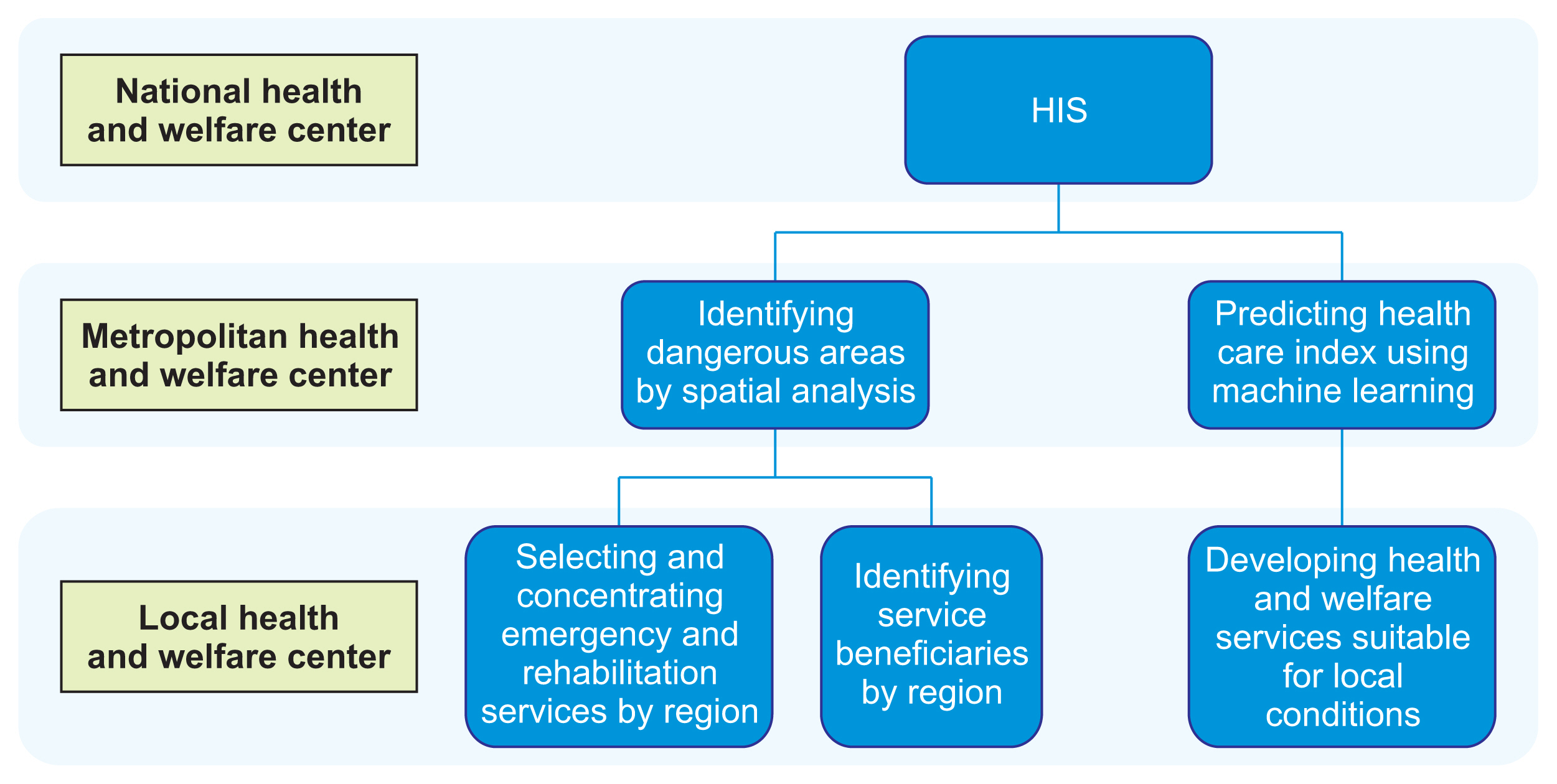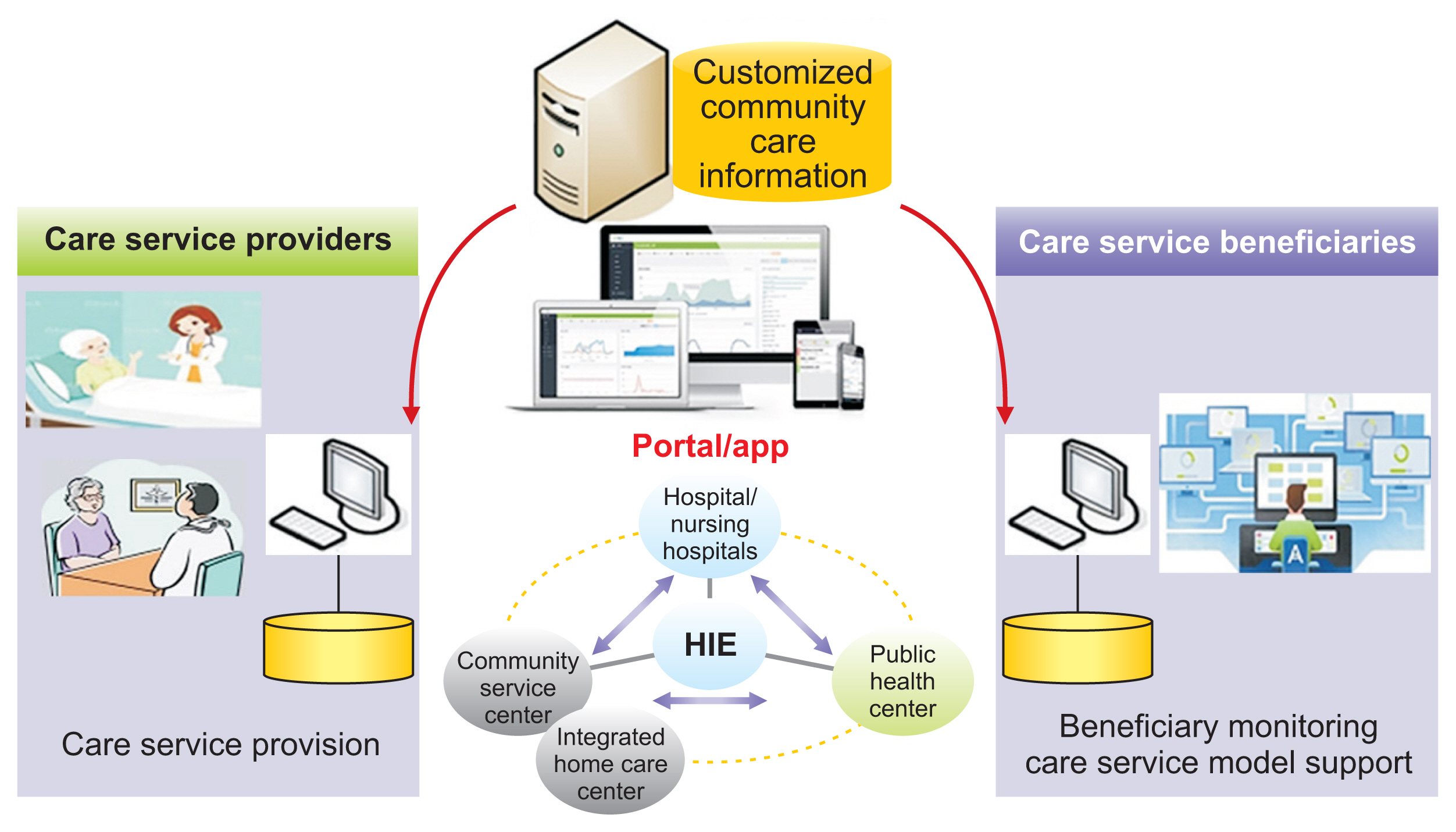Healthc Inform Res.
2021 Jul;27(3):175-181. 10.4258/hir.2021.27.3.175.
Global Trends of Regional Health Information Systems and Suggested Strategic Utilization of their Medical Information
- Affiliations
-
- 1Department of International Healthcare Administration, Daegu Catholic University, Gyeongsan, Korea
- 2Department of Health Policy & Management, Inje University, Gimhae, Korea
- 3Department of Health Informatics and Management, Chungbuk National University College of Medicine, Cheongju, Korea
- 4Department of Rehabilitation Medicine, Konkuk University Medical Center, Konkuk University School of Medicine, Seoul, Korea
- 5Healthcare AI Team, National Cancer Center, Goyang, Korea
- 6Department of Family Medicine, National Health Insurance Service Ilsan Hospital, Goyang, Korea
- KMID: 2519033
- DOI: http://doi.org/10.4258/hir.2021.27.3.175
Abstract
Objectives
Along with the exponentially-growing data produced and accumulated every day through mobile platforms, social networking services, the Internet, and other media, information is becoming increasingly important as a strategic resource. This report presents specific and clear directions and suggests empirical project plans regarding innovations in regional health information systems to promote the utilization of medical information.
Methods
We reviewed and examined documents about global trends and examples of regional health information systems. The problems and solutions of health information utilization and regional health information systems in Korea were analyzed.
Results
This study presented examples of the establishment of health information systems, problems in the use of local healthcare information, and an empirical project for improvement.
Conclusions
The results of this study imply the need for long-term and systematic approaches for the use of medical information and the establishment of a local healthcare information system, along with implementation plans. As a first step, it is imperative to clarify the goal of building a medical information system, the information that must be provided to build the system, and the data that should be collected to provide such information, while moving away from the mentality of focusing on technology-oriented medical information services. In addition, it is necessary to consider information governance, data-based service development, and the medical innovation framework, which are ways to efficiently manage, utilize, and systemize the data to be collected.
Figure
Reference
-
References
1. Maenpaa T, Suominen T, Asikainen P, Maass M, Rostila I. The outcomes of regional healthcare information systems in health care: a review of the research literature. Int J Med Inform. 2009; 78(11):757–71.2. Overhage JM, Evans L, Marchibroda J. Communities’ readiness for health information exchange: the National Landscape in 2004. J Am Med Inform Assoc. 2005; 12(2):107–12.
Article3. Dykes P, Bakken S. National and regional health information infrastructures: making use of information technology to promote access to evidence. Stud Health Technol Inform. 2004; 107(Pt 2):1187–91.4. What is Health Information Exchange? [Internet]. Atlanta (GA): American College of Rheumatology;2010. [cited at 2021 Apr 23]. Available from: https://en.wikipedia.org/wiki/Regional_Health_Information_Organization .5. Marchibroda JM. Health information exchange policy and evaluation. J Biomed Inform. 2007; 40(6 Suppl):S11–6.
Article6. Shapiro JS, Kannry J, Lipton M, Goldberg E, Conocenti P, Stuard S, et al. Approaches to patient health information exchange and their impact on emergency medicine. Ann Emerg Med. 2006; 48(4):426–32.
Article7. Lalonde M. A new perspective on the health of Canadians [Internet]. Ottawa, Canada: Minister of National Health and Welfare;1974. [cited at 2021 Apr 23]. Available from: https://nccdh.ca/resources/entry/new-perspective-on-the-health-of-canadians .8. World Health Organization. The Ottawa Charter for Health Promotion [Internet]. Geneva, Switzerland: World Health Organization;c2021. [cited at 2021 Apr 23]. Available from: http://www.who.int/healthpromotion/conferences/previous/ottawa/en/index.html .9. Grossmann C, Powers B, Michael McGinnis J. Digital infrastructure for the learning health system: the foundation for continuous improvement in health and health care: workshop series summary. Washington (DC): National Academies Press;2011.10. Kloss L. Implementing health information governance: lessons from the field. Chicago (IL): AHIMA Press;2015.11. Braunstein ML. Contemporary health informatics. Chicago (IL): AHIMA Press;2014. p. 64–80.12. Magnuson JA, Dixon BE. Public health informatics and information systems. 3rd ed. Cham, Switzerland: Springer Nature;2020.13. Lee KS, Lee SK, Lee MS, Lee JJ, Ryu SY, Kim HS, et al. Research for improvement of public health information system. Sejong, Korea: Ministry of Health and Welfare, Konkuk University;2016.14. Shin JW. The challenge of improving the collection and use of electronic medical records. Health Welf Policy Forum. 2018; (262):29–38.15. Brown MM, Luo B, Brown HC, Brown GC. Comparative effectiveness: its role in the healthcare system. Curr Opin Ophthalmol. 2009; 20(3):188–94.
Article16. King RJ, Garrett N, Kriseman J, Crum M, Rafalski EM, Sweat D, et al. A community health record: improving health through multisector collaboration, information sharing, and technology. Prev Chronic Dis. 2016; 13:E122.
Article17. Ministry of Culture, Sports and Tourism. Integrated community care services (Community Care) [Internet]. Sejong, Korea: Ministry of Culture, Sports and Tourism;2018. [cited at 2021 Apr 23]. Available from: https://www.korea.kr/special/policyCurationView.do?newsId=148866645 .18. Federal Data Strategy. 2020 Action Plan [Internet]. Washington (DC): Federal Data Strategy;2020. [cited at 2021 Apr 23]. Available from: https://strategy.data.gov/action-plan/ .
- Full Text Links
- Actions
-
Cited
- CITED
-
- Close
- Share
- Similar articles
-
- Integrated Information Systems for Strategic Management in Hospitals
- The Influence of Job Category and Position on the Information Deficiency: The Case of Korean General Hospital Personnel
- Geographical Information Systems and Health: Current State and Future Directions
- Trends in Health Information Technology Safety: From Technology-Induced Errors to Current Approaches for Ensuring Technology Safety
- Ubiquitous Health in Korea: Progress, Barriers, and Prospects




